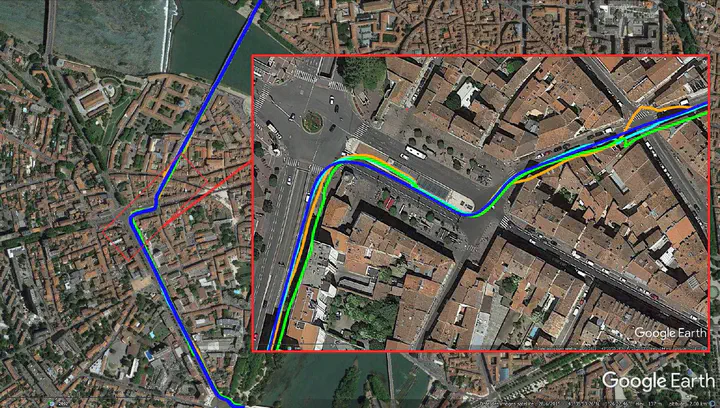Multipath Mitigation for GNSS Positioning in an Urban Environment Using Sparse Estimation

Abstract
Multipath (MP) remains the main source of error when using global navigation satellite systems (GNSS) in a constrained environment, leading to biased measurements and thus to inaccurate estimated positions. This paper formulates the GNSS navigation problem as the resolution of an overdetermined system whose unknowns are the receiver position and speed, clock bias and clock drift, and the potential biases affecting GNSS measurements. We assume that only a part of the satellites are affected by MP, i.e., that the unknown bias vector has several zero components, which allows sparse estimation theory to be exploited. The natural way of enforcing this sparsity is to introduce an $\ell_1$ regularization associated with the bias vector. This leads to a least absolute shrinkage and selection operator problem that is solved using a reweighted-$\ell_1$ algorithm. The weighting matrix of this algorithm is designed carefully as functions of the satellite carrier-to-noise density ratio ( $C/N_0$ ) and the satellite elevations. Experimental validation conducted with real GPS data show the effectiveness of the proposed method as long as the sparsity assumption is respected.
Matlab folder contains:
- create_measurements_its.m, which creates the measurements from the measurement equation (12)
- create_positions.m, which creates the trajectory from equation (10)
- main_its.m, the main file to launch
- plot_results_its.m, which plots the estimated biases and various RMSE over time
- position_filtering_its.m, which filters the state vector over time thanks to the measurements and the sparse bias estimation according to Section II.B) steps 1) to 5) and Section IV.A) step 3)
- solveLasso.m, which solves problem (15), originally from Gautam V. Pendse here
- sparse_gnss.m, which solves the problem (21)
- weights_cn0.m, which computes the C/N0-depending weights according to (30)